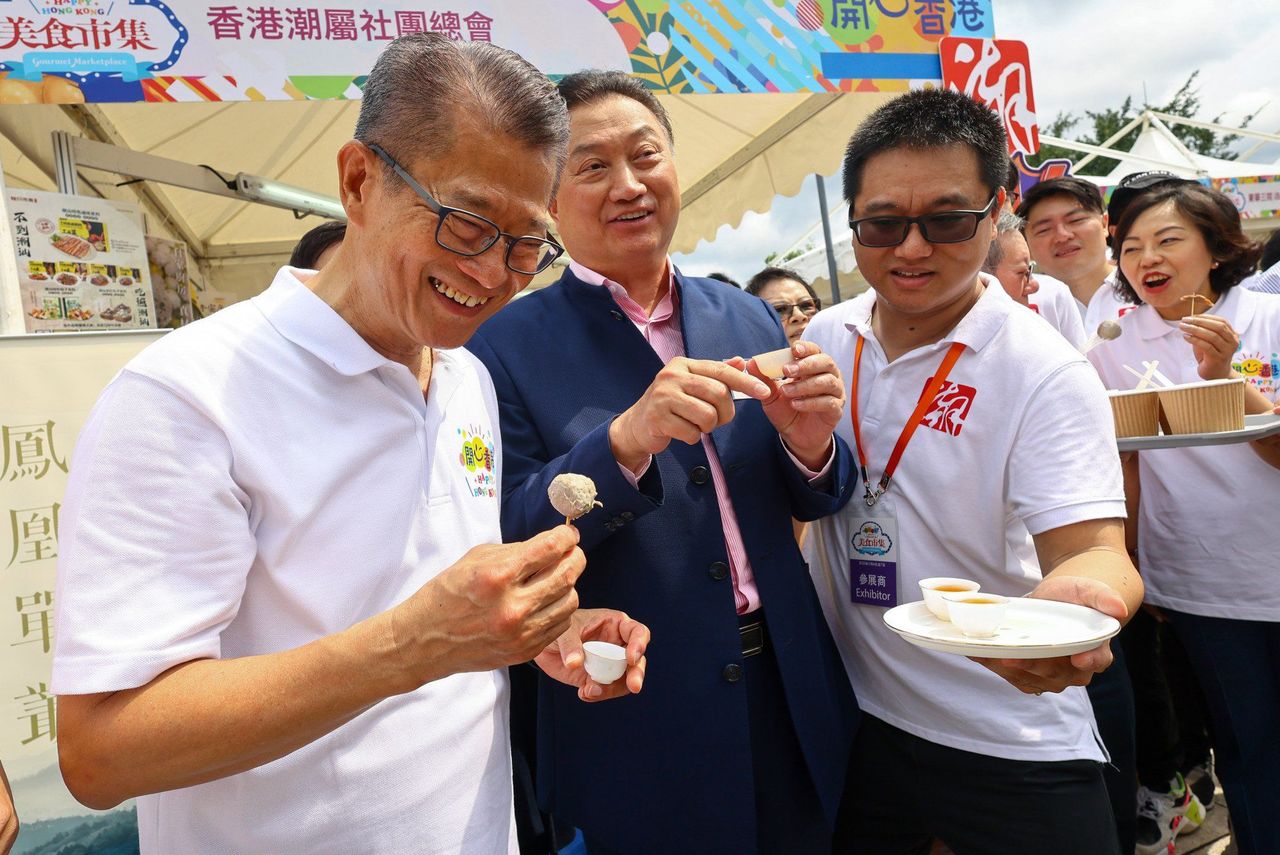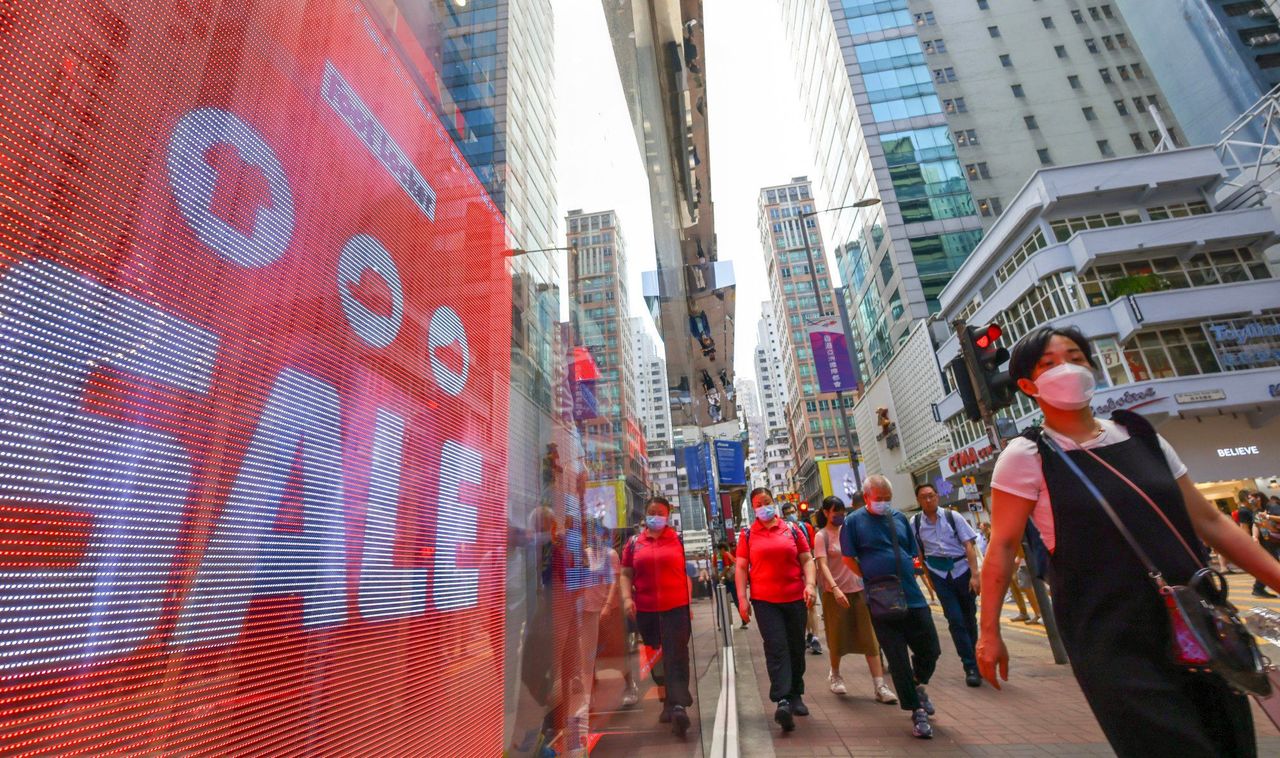Hong Kong News

‘Hong Kong must bolster economy amid rising interest rates, US banking woes’
Hong Kong must bolster its economic recovery in the face of rising interest rates and market uncertainty stemming from banking issues in the United States, the city’s finance chief has said, but added he anticipated stronger performance this year.
Financial Secretary Paul Chan Mo-po on Sunday said he was optimistic about the city’s economy this year because of an influx in visitors and increased spending by locals, but recovery was still in the early stages.
“If the external market conditions do not deteriorate sharply, Hong Kong’s economy is expected to experience a quarter-by-quarter improvement, with our series of measures to support internal demand and the continued enhancement of imports and exports with mainland China,” he wrote in his weekly blog.
 Financial Secretary Paul Chan (left) at a “Happy Hong Kong” food fair in Sha Tin.
Financial Secretary Paul Chan (left) at a “Happy Hong Kong” food fair in Sha Tin.
He pointed to year-on-year economic growth of 2.7 per cent in the first quarter of 2023 after the return of tourists prompted a rebound in the city’s food, catering and retail industries.
Economic growth in the first quarter also ended a contraction over the previous four quarters.
During the first three months of this year, the total revenue for restaurants jumped 82 per cent from the year before to HK$27.56 billion (US$3.51 billion) – the highest amount in more than three years.
Chan said the increase was partly due to a low base effect as the city had sunk to its lowest ebb during the first quarter of last year, when the fifth wave of the coronavirus pandemic led to tightened social-distancing rules.
Discussing this year’s first quarter, the finance chief said retail sales, private consumption expenditure, service exports and fixed investment had all recorded a rebound. But overall merchandise exports had declined 18.7 per cent from the previous year due to factors such as a weak external environment, he added.
“These figures reflect that Hong Kong’s economic recovery is still in its initial stage and needs to be strengthened,” he said.
Citing the decision of the US Federal Reserve to raise interest rates by a quarter percentage point last week, Chan said uncertainty in the global economy had added pressure to the city to strengthen its nascent recovery.
“Although the market expects the end of the rate hike cycle, the interest rate will remain high for some time,” he said.
“In addition, market anxiety has been exacerbated by the recent financial troubles of several US banks, leading to more uncertainty in the external economy.”
But the finance chief expressed confidence in Hong Kong’s economy, saying it would enjoy better performance this year compared with the previous one.
While unveiling his annual budget blueprint earlier this year, Chan said the city’s gross domestic product (GDP) was expected to experience growth ranging from 3.5 per cent and 5.5 per cent in 2023 compared with the previous year.
In 2022, GDP shrunk 3.5 per cent, reflecting the economic repercussions of the pandemic.
Professor Terence Chong Tai-leung, executive director of Chinese University’s Lau Chor Tak Institute of Global Economics and Finance, said he expected Hong Kong’s economy would experience a quarter-by-quarter improvement in the next two years.
“I believe the economic momentum will be sustained and there will be an upwards trend in the coming two years,” he said. “But there is still huge room for improvement in tourism, financial activities and the import and export trade compared with 2019.”
 The city has experienced a rebound in its food, catering and retail industries.
The city has experienced a rebound in its food, catering and retail industries.
He estimated a year-on-year GDP growth of 2 to 3 per cent in the second quarter of 2023, and 4 per cent for the entire year.
But he also predicted exports to Europe and the US would improve in the next few months before shrinking later this year as the country was tipped to slip into a recession.
The latest official data shows Hong Kong’s exports to the mainland were down 9.8 per cent year-on-year in March, while those to the European Union and the US jumped 15 per cent and 13.8 per cent, respectively.
Professor Emeritus Francis Lui Ting-ming, from the Hong Kong University of Science and Technology’s department of economics, expressed optimism toward the city’s economic outlook, saying annual GDP growth could reach 4 per cent in 2023 compared with last year.
But Lui said he was not sure if internal demand would drive recovery, as suggested by Chan.
“If [Chan] hopes to stimulate domestic consumption, I don’t think that is a solution as the government can’t always give out consumption vouchers, while revenue generated by the events under the ‘Happy Hong Kong’ campaign is not a big amount,” he said.
Authorities have been introducing a series of measures to stimulate spending and boost economic recovery since April, such as distributing another round of consumption vouchers and launching the “Happy Hong Kong” campaign, which features food fairs and other events over the coming 10 months.
Lui urged the government to invest more in large-scale infrastructure projects, such as the Northern Metropolis scheme in the New Territories. “They will generate long-term economic benefits,” he said.
The Northern Metropolis scheme is a government development project to create an innovation technology-led commercial and residential hub, providing up to 186,000 homes near the border with the mainland.











